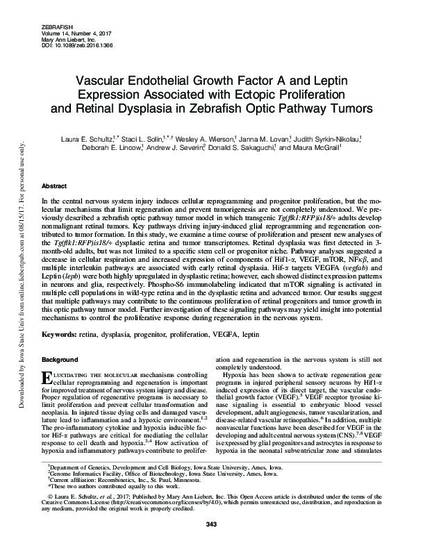
the central nervous system injury induces cellular reprogramming and progenitor proliferation, but the molecular mechanisms that limit regeneration and prevent tumorigenesis are not completely understood. We previously described a zebrafish optic pathway tumor model in which transgenic Tg(flk1:RFP)is18/+ adults develop nonmalignant retinal tumors. Key pathways driving injury-induced glial reprogramming and regeneration contributed to tumor formation. In this study, we examine a time course of proliferation and present new analyses of the Tg(flk1:RFP)is18/+ dysplastic retina and tumor transcriptomes. Retinal dysplasia was first detected in 3-month-old adults, but was not limited to a specific stem cell or progenitor niche. Pathway analyses suggested a decrease in cellular respiration and increased expression of components of Hif1-α, VEGF, mTOR, NFκβ, and multiple interleukin pathways are associated with early retinal dysplasia. Hif-α targets VEGFA (vegfab) and Leptin (lepb) were both highly upregulated in dysplastic retina; however, each showed distinct expression patterns in neurons and glia, respectively. Phospho-S6 immunolabeling indicated that mTOR signaling is activated in multiple cell populations in wild-type retina and in the dysplastic retina and advanced tumor. Our results suggest that multiple pathways may contribute to the continuous proliferation of retinal progenitors and tumor growth in this optic pathway tumor model. Further investigation of these signaling pathways may yield insight into potential mechanisms to control the proliferative response during regeneration in the nervous system.
Available at: http://works.bepress.com/andrew-severin/20/

This article is from Zebrafish. August 2017, 14(4): 343-356.https://doi.org/10.1089/zeb.2016.1366.